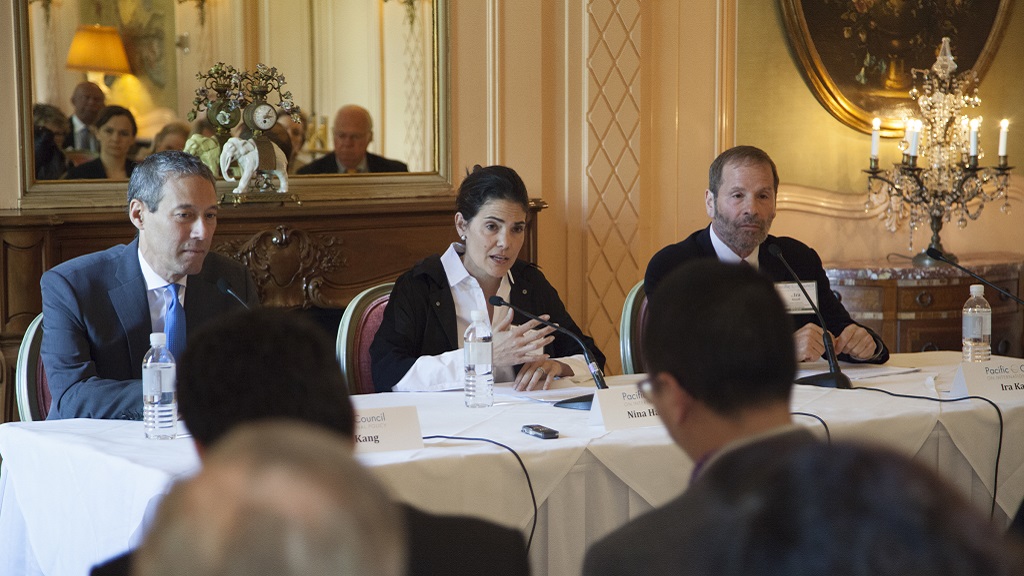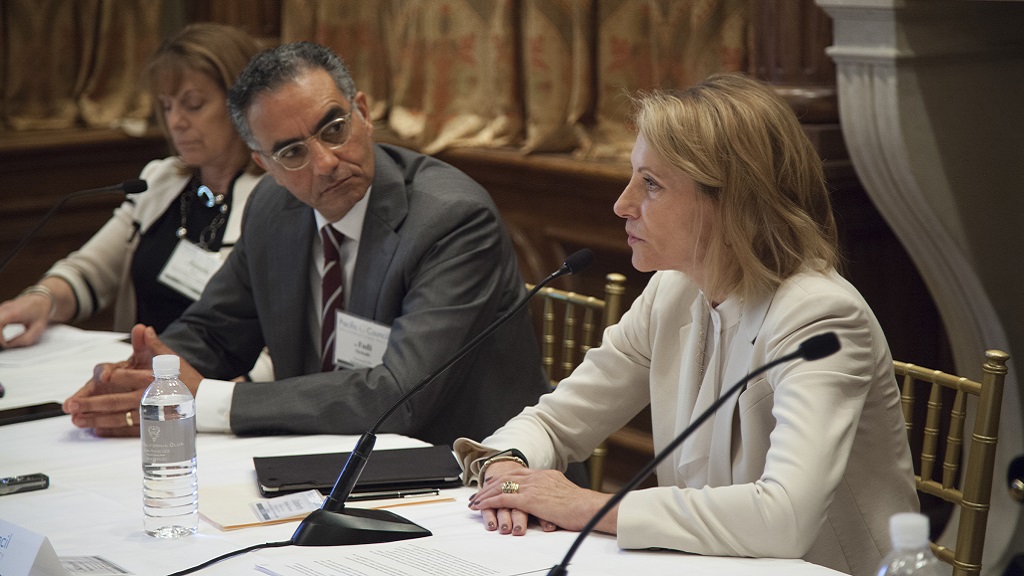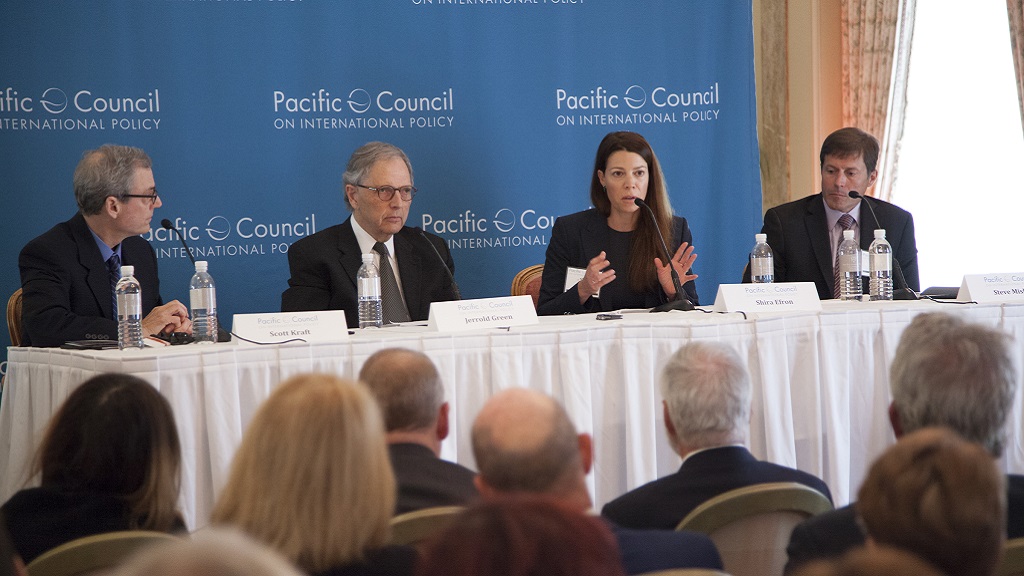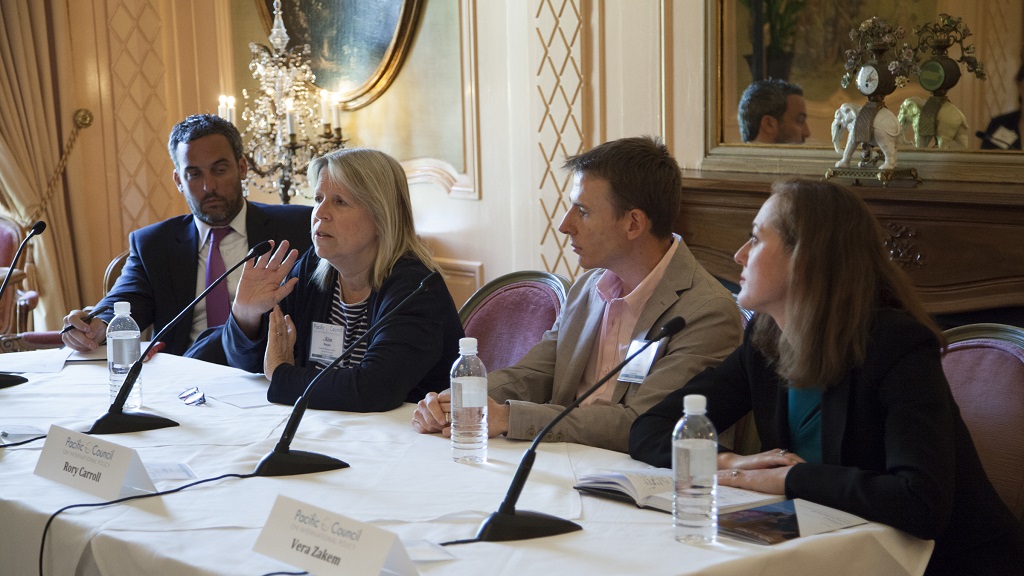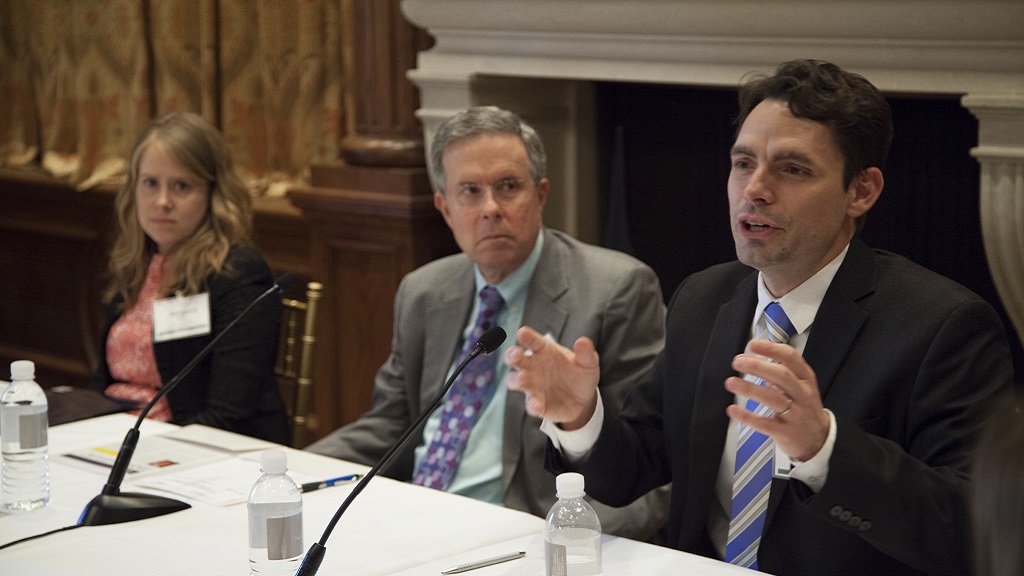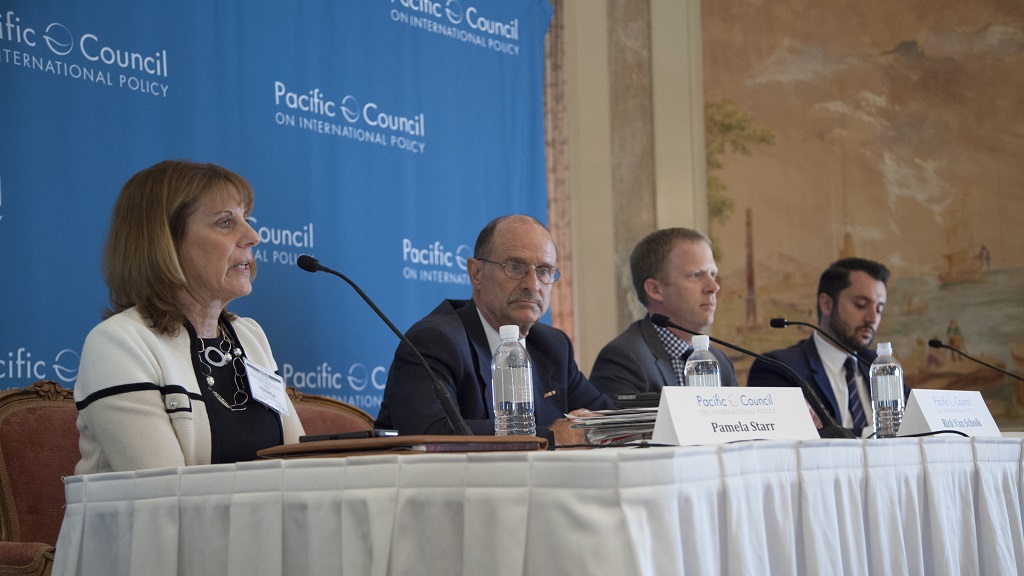Condoleezza Rice: Democracy Must Be Promoted and Celebrated
The United States should continue to promote democracy around the world, Dr. Condoleezza Rice told Pacific Council members. Rice is the author of a new book, Democracy: Stories from the Long Road to Freedom.
Rice was the 66th U.S. Secretary of State (2005-2009). The conversation, moderated by Pacific Council director Ambassador Robert H. Tuttle, was wide-ranging and covered topics such as the wars in Iraq and Afghanistan, cooperating with Russia, the crisis in Venezuela, democracy in China, trade and populism, and more.
"We need to help countries that are trying to find their way to democracy to work on issues of institutional design," said Rice. "Our founding fathers were people who worried a great deal about how institutions would relate to one another. They knew instinctually and with their experiences with the British that a too strong executive was a problem. So they made Congress a separate but equal branch of government. They created courts that could check the power of the president. They created federalism and room for civil society. They advocated for a free press and they put it all together in a remarkable thing called the American Constitution, and it has been evergreen."
Rice added that she’s not necessarily saying that new democracies should look like the U.S. Constitution, but that they should at least have those basic elements.
"You cannot have too strong an executive, or you will get an authoritarian," she said. "You must have a free press. You need an independent judiciary. But the most important thing we can do is be patient. I’m always struck by how impatient we are with countries that are just making those first steps toward a democracy. Of all the people who should be patient, it’s Americans, because it took us quite a while to get it right. The United States was founded with a birth defect: that would be slavery. You need patience to get to that mystical place where people trust institutions."
"I’m always struck by how impatient we are with countries that are just making those first steps toward a democracy. Of all the people who should be patient, it’s Americans, because it took us quite a while to get it right."
Condoleezza Rice
Rice cited a number of examples of countries that have successfully transitioned to democracy.
"We had a very successful set of relatively smooth transitions to democracy after the Soviet Union collapsed," she said. "When you look at countries that were under communist rule and just a few years later are electing parliaments and presidents and have free speech, that’s a relatively remarkable transition to democracy."
She told a story about traveling to Nigeria with President George W. Bush and seeing portraits of former presidents who were all military officials, with one exception.
"This is the continent where ‘president for life’ got coined," said Rice. "When Goodluck Jonathan lost Nigeria’s election in 2015, he called his opponent and he said, ‘You won the election, I concede, and I’m here to help support you.’ Those moments are really quite remarkable because they show that countries are maturing. Now there are plenty that have gone the other way, but we have to celebrate the democracies that are succeeding around the world."
Rice rejected the argument that democracy cannot survive in some regions of the world, such as the Middle East. She particularly took issue with the argument that "those people aren’t ready for democracy," which she finds to be a patronizing argument.
"Often it’s a cultural argument," she said. "When political scientists can’t explain something, their residual category is ‘culture.’ Asians were too Confucian. Well, there are now a bunch of Asian democracies. Africans were too tribal. Well, there are now a bunch of African democracies. Latin Americans preferred caudillos and men on horseback and kept experiencing military coups. Well, there are now a bunch of Latin American democracies. Germans were once too martial and just obeyed orders. Well, they’ve done pretty well with democracy. The only place it is ‘legitimate’ to say this about any longer is the Middle East. It is true that the problems in the Middle East are complicated by the marriage of politics and religion. One of the things the U.S. founding fathers did right was separating politics and religion so that the state could not have a religious preference."
Rice added that the Middle East is experiencing twin revolutions.
"People are saying, ‘Enough with dynastic, autocratic, corrupt regimes that don’t deliver,’" she said. "On top of that, the borders of those countries were artificially drawn on the back of an envelope by the British and the French after the Ottoman Empire collapsed. These states were held together by monarchs and dictators. Due to developments like social media, these states are no longer stable. The only way that the Middle East ultimately achieves peace is through democratic institutions being the way people resolve their differences. Otherwise, someone is just going to oppress someone else."
On the wars in Iraq and Afghanistan
Rice lamented that Americans have become reluctant about democracy promotion, which she said is likely because they associate it with the wars in Iraq and Afghanistan.
"But those were not about democracy promotion," she argued. "I would not have gone to President Bush and said, ‘Use the American military to overthrow Saddam Hussein and the Taliban so that we can bring democracy to Iraq and Afghanistan.' That would have been a misuse of military power. We overthrew those regimes because we had security problems. In Afghanistan, the Taliban was harboring al Qaeda after 9/11. In Iraq, Hussein was a threat in the region; we thought more imminent because we thought he had reconstituted his program of weapons of mass destruction. But we didn’t go to Iraq and Afghanistan to bring democracy any more than we went to Germany to bring democracy when we overthrew Adolf Hitler. However, once you have decapitated a totalitarian regime, you have to have a plan for what comes after. We thought Iraq and Afghanistan ought to have a chance for democracy."
Ultimately, Rice explained, promoting democracy means standing up for those who are oppressed around the world, which she said is a worthy objective for the United States.
On cooperating with Russia
Despite being adversaries and despite the ongoing complications in U.S.-Russia relations, Rice said that there are areas where the United States and Russia could and should cooperate with each other. She acknowledged, however, that it will not be easy.
"Putin thinks he’s uniting the Russian people in greatness and avenging the end of the Cold War," said Rice. "He has called the collapse of the Soviet Union ‘the greatest tragedy of the 20th century.’ That makes U.S.-Russia relations pretty difficult because his view is one that’s revisionist and revanchist about the end of the Cold War."
"I would not have gone to President Bush and said, ‘Use the American military to overthrow Saddam Hussein and the Taliban so that we can bring democracy to Iraq and Afghanistan.' That would have been a misuse of military power."
Condoleezza Rice
Rice said that one area where the United States should cooperate with Russia is the war in Syria.
"Because we didn’t act in Syria four or five years ago, the Russians filled the vacuum," she said. "We wouldn’t be in this situation if we had acted. Sometimes when you don’t act, you lose options. We will live forever with the stain of not having acted and the hundreds of thousands of Syrians who died as a result and the millions of Syrians who were displaced. We can’t make Bashar al-Assad go away, but the Russians can. We should say to the Russians, ‘Are you sure you want to pin your hopes on Assad?’ We’re going to have to end this war through Moscow. We need to convince Putin that Assad is not Russia’s best long term strategy."
The other place where the United States and Russia should cooperate is North Korea, Rice said.
"If a missile can reach Alaska, it can reach Vladivostok," she said. "They must not like what they’re seeing in North Korea either."
On the crisis in Venezuela
Rice said that the political and economic crisis in Venezuela should be getting much more attention than it currently is.
"Maduro is like Chavez without the charm or brains," said Rice. "I don’t understand why the Organization of American States and Latin American countries are not all over Maduro to have a transition to elections in a couple years so that you can get this half-crazy, brutal person out of the region and end this tragedy in Venezuela. Because if somebody doesn’t find a peaceful way out of this, there’s going to be a violent revolution. If the Andean states think they’ve got problems now, just wait until that happens."
Rice said that Venezuela needs to be a top priority for the United States, but that Latin American countries must also help.
On Chinese democracy
Rice also made the case for promoting democracy in China, while pointing out that the dynamic between its communist political system and market reforms will eventually force a further liberalization of the society.
"I think nature is going to take its course," said Rice. "The Chinese government is depending on the fact that it has legitimacy based on prosperity, but you can only count on that for so long because people’s expectations keep growing. They know they need to reform to a more market-based economy. But once you release those market forces, you can’t really control the country from the top-down anymore. Now there’s an uncomfortable fit between an authoritarian political system and an economic system that’s changing quite dramatically underneath. Over time, China will have to make some moves toward liberalization. The question is, will the government be smart enough to see it?"
"I’m confident in America’s democratic institutions to handle just about anything."
Condoleezza Rice
Rice argued that the United States should continue to speak for those who are voiceless in China, such as human rights advocates and fighters for religious freedom.
"One day, people in China are going to get their rights, and if we take our eye off the ball here we will have been on the wrong side of that history," she said.
On trade and populism
Rice pointed out that the anti-trade sentiment in the Trump administration is part of broader backlash against globalization.
"In order to get back to a place where we are comfortable with trade again, we’ve got to deal with the basic causes of this attraction toward populism," she said. "The fact is there are a lot of people who are not doing very well. They were desperate and angry and they were looking for somebody to give them a reason for why they weren’t doing very well. Populists give you easy reasons. They tell you it’s the immigrants, it’s the Mexicans, it’s the Chinese. If you’re on the left, it’s the big banks. Of course, we all know that that’s not why people aren’t doing very well. It’s broad changes in the economy—automation and a whole bunch of other reasons—that people with low skills are not doing very well. You’ve got to address that problem in order to get back to a place where people are comfortable advocating for free trade again."
"The fact is there are a lot of people who are not doing very well. They were desperate and angry and they were looking for somebody to give them a reason for why they weren’t doing very well."
Condoleezza Rice
Rice pointed out that populists have changed the conversation, so that even political centrists now will not talk about free trade and immigration the way they used to. She added that identity is a part of this equation as well.
"Most people never live more than 25 miles from where they were born, compared to the global elites who move freely around the world," she said. "There was bound to be a culture clash, particularly because global elites got very self-satisfied, started denigrating the values of people who weren’t part of the global elite, laughing at them, putting them down, saying they were attached to their guns and religion, and they got mad. A friend of mine called the 2016 election the ‘Do you hear me now?’ election."
She added that it is not going to be enough to simply defend the liberal order. These underlying issues will have to be addressed as well.
"However," she concluded, "I’m confident in America’s democratic institutions to handle just about anything."
____________________
Justin Chapman is the Communications Associate at the Pacific Council on International Policy.
Ahead of this event, Dr. Rice wrote an article for the Pacific Council’s Newsroom about why the United States needs to make every effort to reinvigorate democracy around the world. Read it here.
Check out photos from this event on our Flickr page.
The views and opinions expressed here are those of the speaker and do not necessarily reflect the official policy or position of the Pacific Council.
